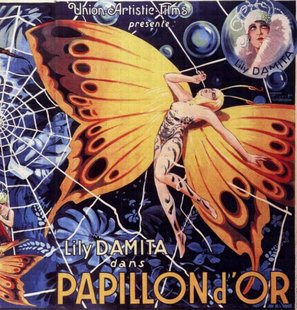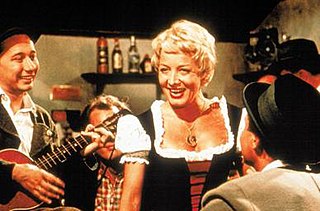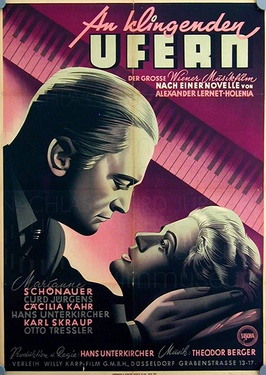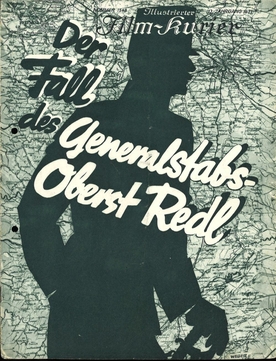
Elfriede "Elfi" von Dassanowsky was an Austrian-born singer, pianist and film producer.

Robert von Dassanowsky FRHistS, FRSA is an Austrian-American academic, writer, film and cultural historian, and producer. He is usually known as Robert Dassanowsky.
Fritz Schulz was a German and Austrian movie and stage actor, singer and director.

Young Medardus is a 1923 Austrian silent historical drama film directed by Michael Curtiz and starring Victor Varconi, Egon von Jordan and Agnes Esterhazy. Based on a play with the same name by Arthur Schnitzler, it is set during the 1809 French occupation of Vienna during the Napoleonic Wars.

The Last Bridge is a 1954 Austrian-Yugoslavian war drama film directed by Helmut Käutner and starring Maria Schell, Bernhard Wicki and Barbara Rütting. It tells the story of a German nurse who is captured by Yugoslav partisans, and with her devotion to medical duty finds herself with divided loyalty to both sides of the conflict. The film was entered into the 1954 Cannes Film Festival.

The Golden Butterfly is a 1926 Austrian-German silent drama film directed by Michael Curtiz and starring Hermann Leffler, Lili Damita and Nils Asther. It was based on the 1915 short story "The Making of Mac's" by British author P. G. Wodehouse. The film was released in the United Kingdom as The Golden Butterfly, in a form shortened to 5 reels, and had a limited release in the US under the title The Road to Happiness.

The Inheritance of Bjorndal is a 1960 Austrian drama film directed by Gustav Ucicky and starring Maj-Britt Nilsson, Brigitte Horney and Ellen Schwiers. It is the sequel to the 1959 film The Forests Sing Forever.
Sievering Studios were film production studios located in Sievering, a suburb of the Austrian capital Vienna.

Your Heart Is My Homeland is a 1953 Austrian-West German drama film directed by Richard Häussler and starring Inge Egger, Erwin Strahl and Viktor Staal. It is also known as Magdalena Percht after the lead character. It is part of the trend of post-war heimatfilm. It was shot at the Bavaria Studios in Munich and on location in Salzburg.

War of the Maidens is a 1957 Austrian-German comedy film directed by Hermann Kugelstadt and starring Oskar Sima, Kurt Heintel and Mady Rahl. It was shot at the Schönbrunn Studios in Vienna and at the studios in Salzburg. The film's sets were designed by the art director Wolf Witzemann.

With Heart and Hand for the Fatherland is a 1915 Austrian silent war drama film directed by Jacob Fleck and Luise Fleck and starring Hubert Marischka, Hermann Benke and Liane Haid. The composer Franz Lehár, better known for his operetta, created a score to accompany the film during screenings.
With God for Emperor and Empire is a 1916 German silent war drama film directed by Jacob Fleck and Luise Fleck and starring Hermann Benke and Liane Haid. The celebrated operetta composer Karl Michael Ziehrer wrote a score to accompany the film at screenings.
Rigoletto or The King Amuses Himself is a 1918 Austrian silent historical film directed by Jacob Fleck, Luise Fleck and starring Wilhelm Klitsch, Hermann Benke and Liane Haid. It is based on the 1832 play by the French writer Victor Hugo. To recreate the look of Paris in the early sixteenth century, location shooting took place at the neo-gothic Vienna City Hall.
The Tales of Hoffmann is a 1923 Austrian silent film directed by and starring Max Neufeld. The film also features Karl Ehmann, Eugen Neufeld and Robert Valberg.

The Adventures of Count Bobby is a 1961 Austrian comedy film directed by Géza von Cziffra and starring Peter Alexander, Vivi Bach and Gunther Philipp. It was the first in a trilogy of films featuring the character Count Bobby.

On Resonant Shores is a 1948 Austrian drama film directed by Hans Unterkircher and starring Marianne Schönauer, Curd Jürgens and Otto Tressler. The screenplay was by Alexander Lernet-Holenia who also wrote a novella based on the story. It was shot on location in the Austrian state of Carinthia including at Gurk Cathedral and around Lake Ossiach. The film's sets were designed by the art director Ernst Rampak. It was praised by Austrian film critics.

Schweik's Awkward Years or Schweik's Years of Indiscretion is a 1964 Austrian comedy film directed by Wolfgang Liebeneiner and starring Peter Alexander, Rudolf Prack and Gunther Philipp. It is based on the novel The Good Soldier Schweik by Jaroslav Hasek.
Walter Tuch (1913–1969) was an Austrian cinematographer. He was active in both Austrian and West German cinema, and later in television. He was the younger brother of actress Jane Tilden.

The Case of Colonel Redl is a 1931 German spy drama film directed by Karl Anton and starring Theodor Loos, Lil Dagover and Otto Hartmann. It was co-production between the Prague-based company Elektafilm and Sonor Film. A separate Czech-language film The Affair of Colonel Redl was also produced. It was based on a 1924 novel of the same title by Egon Kisch, based on the story of Alfred Redl.













